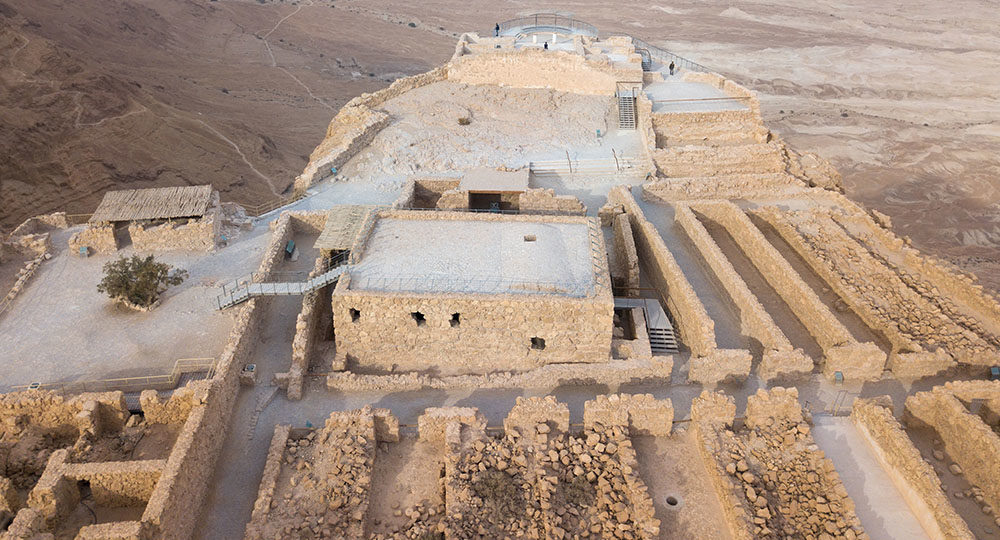Pursuing the Finish-It Principle
When I first walked the snaking path that winds its way to the summit of Masada nearly four decades ago, a special feeling permeated the atmosphere. Looking down from the plateau of the old Herodian fortress and remembering what took place there two millennia ago is a heart-stopping experience. It was there that Roman legionnaires spent three years in the scorching heat of the Judean wilderness to subdue 960 Jewish survivors at the fall of Jerusalem in A.D. 70.
Rome’s mission was a symbolic necessity. A paltry few Jews atop a sterile rock 1,200 feet above the desert floor by the Dead Sea were no threat to the empire. The issue was their defiance of Caesar, who considered survivors a threat to Roman supremacy and a potential rallying point for others with seditious tendencies. Therefore, he dispatched the legion for a single purpose: to finish it with the Jews. In the end, however, Rome was deprived of victory because the Jewish survivors finished it themselves by committing mass suicide. The story of Masada and the place’s existence today are sobering monuments to the perpetual war between imperialists and those seeking only to maintain order and live in peace. That the conflict has survived so long should surprise no one, and the stakes remain the same.
I remember most vividly the words often repeated on that visit: Never again. They are credited to poet Yitzhak Lamdan who, in the 1920s, wrote an epic poem presenting Masada as the last stronghold of the Jewish people. He concluded it with the words Masada shall not fall again. As was the case with the Roman contrivances—the siege ramp and the stone walls built to ensure that no one would escape off the mountain—the Jews of Judea saw themselves surrounded by enemies pledged to their destruction. So ingrained in the nation’s psyche was the commitment to survival that, until a few years ago, the Israel Defense Forces Armored Corps and paratroopers would make a torchlight pilgrimage to Masada’s summit to take their oath of service. The ceremonies concluded with the cry, “Masada shall not fall again!” Their promise to the State of Israel was that survival would be assured by commitment, vigilance, and the strength to finish conflict with victory.
Years later I heard the same sentiments from Israel’s military and political leaders. No one enters a military conflict without intending to finish it. That fact reminds me of my father’s words to me as a boy. “Never,” he often said, “get into a fight you don’t intend to finish.” In this day of “time outs” and “let’s discuss it,” such advice may appear primitive or antisocial. In the world I inhabited more than 60 years ago, however, bullies were not mollified by kindness or dialogue. You either defended yourself or ran away. And running was never more than a temporary solution.
The Finish-It Option
Today we seem to be foundering in a sea of inconclusiveness. Nothing ever seems to be finished. Prof. Barry Rubin, director of the Global Research in International Affairs Center (GLORIA) in Herzliya, Israel, offered an explanation in an article titled “The West Is Losing Because It Thinks Itself the Enemy.” Rubin commented on conclusions of former UN envoy Alvaro de Soto who left the Middle East, blaming the United States and Israel for Hamas’s fanaticism.
De Soto, wrote Rubin, embraces the argument that “these [terrorist] movements are not motivated by an extreme doctrine, a thirst for power, and a desire to loot but by ‘unspeakable social conditions’ through which ‘small groups of exploiters and imperialists, through their terrible deeds, have driven millions of people out of their minds. Perhaps a population has been humiliated beyond human endurance.’”
De Soto’s theme embodies threads of a fundamental ideology now paralyzing any realistic appraisal of events. It runs something like this: Terrorists and murderers deserve no-fault status because their victims are really the perpetrators; their victims forced them to become evil, suicidal fanatics because of social deprivation and injustices that compelled the adoption of genocide as a desirable instrument of retribution.
And while the democracies fret in UN committees over what we collectively have done to cause such depraved “reactions,” the killers continue to wreak unremitting havoc to suit their purposes.
At the root of this problem lies (1) a failure to acknowledge the existence of evil and (2) a lack of moral capacity to dictate what should be done about it.
Think of the many times these days when indifference or the lack of response to a horrible crime elicits the frustrated cry, “Where’s the outrage?” or “Why isn’t something being done about this?”
The answer is that we have abandoned our forefathers’ road map to moral perspicuity and social and political conduct. That road map to structure, order, and stability was transmitted by the standards articulated in the Word of God. Morality was not defined by individuals or parties but by distinct principles that regulated what was right and what was wrong.
The liberal news media, as well as political and religious figures, often speak of “moral equivalency” when discussing the Middle East. The “moral equivalency” they invoke is a misnomer. But the term does confirm their failure to recognize the existence of a rational moral order that sees the difference between good and evil. There is no moral equivalence between homicide bombers and the busload of innocent school children they deliberately slaughter.
The prophet Habakkuk described a similar condition in the seventh century B.C. His was a time when evil had upset the order of things, and it appeared everything was turned upside down. The righteous were viewed as evildoers, good was regarded as evil, right became wrong, and corruption and disorder saturated the land. “Therefore,” the prophet lamented, “the law is powerless, and justice never goes forth. For the wicked surround the righteous; therefore perverse judgment proceeds” (Hab. 1:4).
When “everyone did what was right in his own eyes,” the result was one of the most chaotic, immoral, and spiritually bankrupt eras in the history of Israel. The book of Judges records it as a time of moral decline repeatedly identified as “evil in the sight of the Lᴏʀᴅ” (2:11; 3:7, 12; 4:1; 6:1; 10:6; 13:1). Matters were corrected only when men and women of character rooted out the evildoers. In a manner of speaking, they finished it.
It’s a lesson to be learned. Appeasement and concessions will not buy off those bent on destroying your society and mutilating your way of life. Endless dialogue and inconclusive nonsolutions only grant tyrants time to mock weakness and sharpen their weapons.
The current situation in the Gaza Strip makes the point. Hamas is a terror organization that has vowed since its inception to destroy Israel in the name of religion. Nevertheless, Palestinians tolerated, then embraced it. The time came when Hamas, listed as an official terrorist entity by America and others, was allowed into the Palestinian political process. The result was the military insurrection by which Hamas took control of Gaza.
In June al-Qaida’s deputy leader called on Muslims around the world to fortify Hamas with weapons, money, and attacks on U.S. and Israeli interests; and he urged Hamas to unite with al-Qaida’s “holy warriors” after the Hamas takeover of the Gaza Strip. Furthermore, the Associated Press reported that he told Hamas leaders to institute Islamic Sharia law in Gaza saying, “Taking over power is not a goal but a means to implement God’s word on earth.” By “God’s word” he meant the Qur’an.
Clearly, evil is a progressive malady. If tolerated, it will eventually consume the entities that allow it to feed off them.
The Jesus Example
Some may say the finish-it principle is not very Christian. Oh, but it is. It was a principle Jesus lived and served in the most exemplary fashion.
To be sure, His arena was spiritual rather than political; but the principle is the same. Christ set out on His mission of redemption fully aware of the trials, suffering, and agonies He would endure along the way. But He persevered without wavering until He could say from His cross, “It is finished.” Thus was completed the greatest campaign against evil ever waged on this planet. And in finishing it, He certified the eventual, total triumph God promised and the future reign of the Messiah from David’s hallowed throne.
His was the ultimate finishing blow to all that has and will beset the planet—the ultimate finish-it proclamation.
For now, however, we must live with the realization that the law of the secular world is the law of the jungle. Aggressor nations are carnivorous. The strong survive; the weak perish. Those who wish to survive must show strength and determination. Doing so involves sacrifice and often-unpleasant actions. But in the present, ugly reality of things, talk alone is more a way to the graveyard than to utopia.
These principles should have been engraved in the minds of Western leaders for more than 60 years following the “peace in our time” folly of appeasement in the Hitlerian era. That self-imposed hallucination ultimately cost in excess of 50 million lives, and the scars can still be seen in the thousands of acres of white crosses that mark the graves of our fallen heroes.
But for all of the agonies brought about by the mud and blood of the conflict remembered as World War II, there is something to say for the character of the combatants and those who led the forces of emancipation. They refused to stop short of the finish line. In their minds, the only viable action was to obtain the enemy’s total surrender. War was something freedom-loving people did not initiate. But when it was thrust upon them, they deemed “finish it” the only desirable option.
It is, I think, for good reason that those who carried the weight of that war are remembered as “the greatest generation.” The guiding philosophy of finishing well stands as the greatest legacy they passed to us. Are we losing the will or integrity to follow in their footsteps?
“Never forget” is not an option but an obligation.







